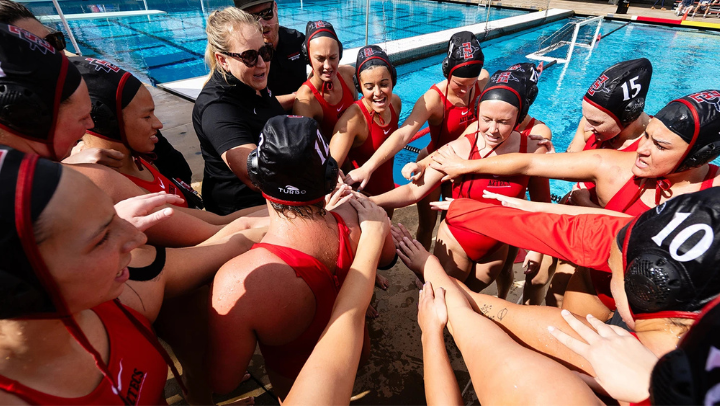Compact Honored for Innovation
SDSU's Compact for Success was named the leading innovator in higher education by National Journal.

National Journal recently named San Diego State University’s Compact for Success program as the “leading innovator in higher education” and invited Janet Abbott, one of the program’s directors to speak at their annual Back in Business forum held in Washington, D.C. on June 19.
“It’s exciting to see our local program represented at the national level,” said Abbott. “What I hope to see in the future is Compact replicated at other universities across the country so other students can benefit.”
Long-term support
Compact for Success is a partnership between SDSU and the Sweetwater Union High School District, one of the largest and most diverse secondary school districts in California. Students who meet certain academic benchmarks are guaranteed admission to SDSU and then provided with the resources they need to be successful in college all the way through graduation.
The Compact for Success program begins with students in the seventh grade, when they take a tour of SDSU and choose a path of curriculum designed to prepare them for higher education.
Once they are admitted into SDSU, they become Compact Scholars and have access to resources — such as one-on-one advising, scholarship opportunities and leadership opportunities — to help them succeed.
The Sweetwater Union High School District serves more than 40,000 students in the South Bay cities of Chula Vista, Imperial Beach, National City and San Diego, including the communities of Bonita, Eastlake, Otay Mesa, San Ysidro and South San Diego.
Continuing success
In May, the fourth class of Compact Scholars graduated from SDSU and the college enrollment rate of the program has increased by 131 percent.
"The students aren’t just graduating," said Abbott. "Many of them are going on to be very successful."
"Compact Scholars have moved on to graduate school at universities including Harvard University, University of Southern California and University of Michigan and have begun careers in a variety of fields including business, education and the health professions."
A leading innovator
According to National Journal, Compact for Success was chosen as the leading innovator in higher education because it has proven a creative, highly collaborative way of expanding opportunity for high school students and because of its “comprehensive and sustained approach to one of education’s toughest problems: shepherding more minority young people to advanced degrees at a time when they represent most of the workforce’s future growth.”
“Compact is not just about access,” said Abbott. “It’s not solely about admitting them to SDSU, but it is also about supporting the students so that they graduate from SDSU. We offer long-term support, working with these students from grades 7 to 16, providing them a pipeline to graduation and beyond.”
A pipeline to graduation
The “pipeline to graduation” was the central message of Abbott’s portion of the panel discussion in Washington, D.C. “The Necessity of Education: Entering the New Workforce” panel was moderated by National Journal correspondent Fawn Johnson and included Abbott as well as Teresa Luna, director of administration for the Idaho Education Network; Roberto Rodriguez, special assistant to the president of education policy in the Executive Office of the President; and Tom Rudin, vice president for career readiness at the College Board.
Abbott earned her bachelor’s degree and California Teaching Credential from the University of San Diego and her master’s degree in higher education administration from Teachers College at Columbia University. She is founding director of Compact Scholars and began working on the program in 2005, more than a year before the first Compact Scholar was admitted to SDSU.



